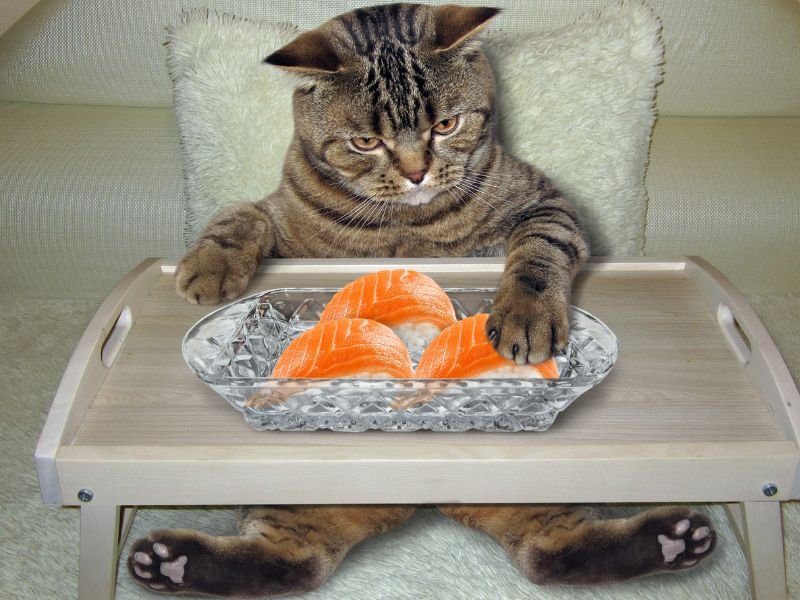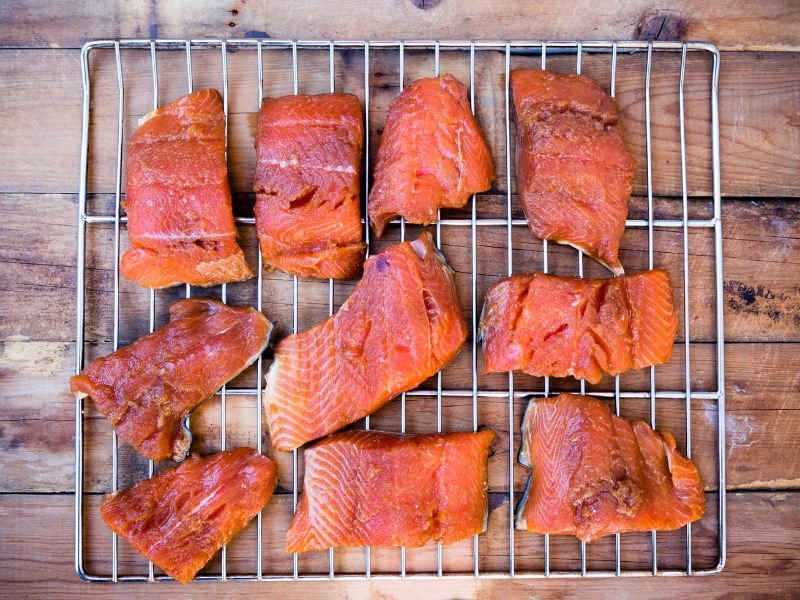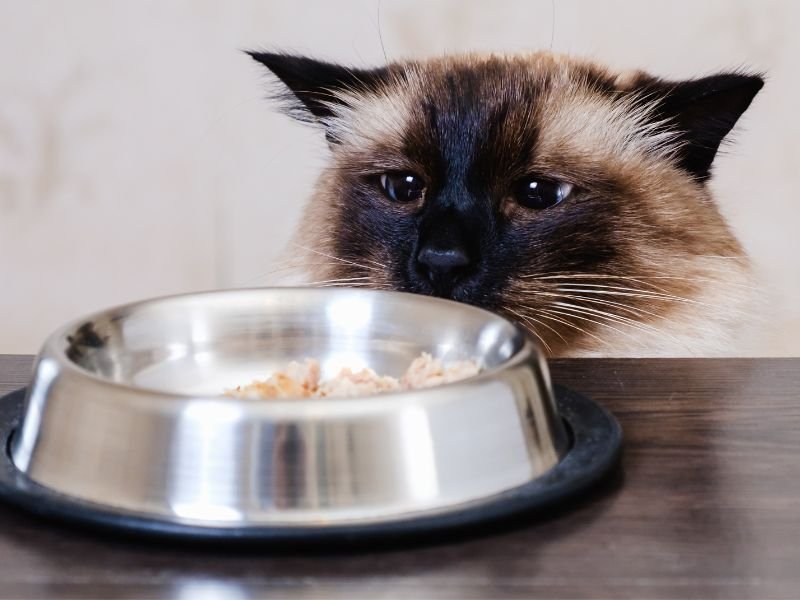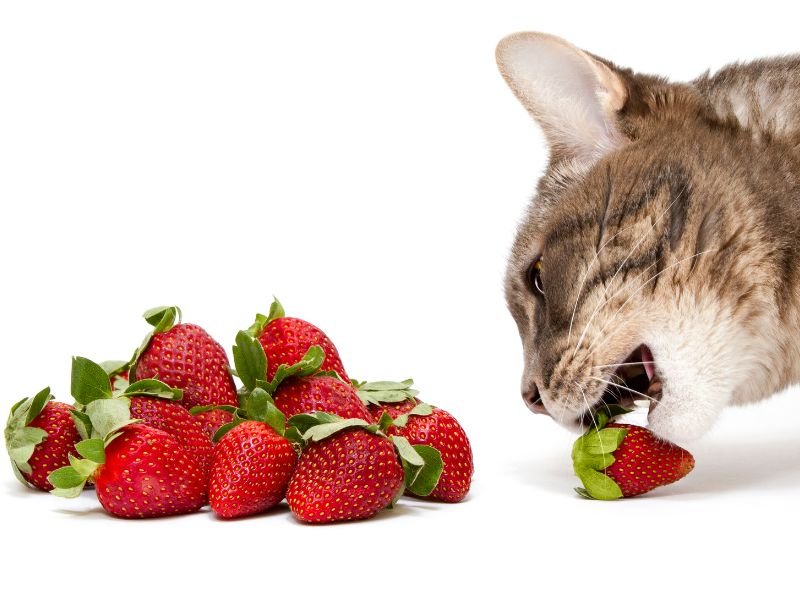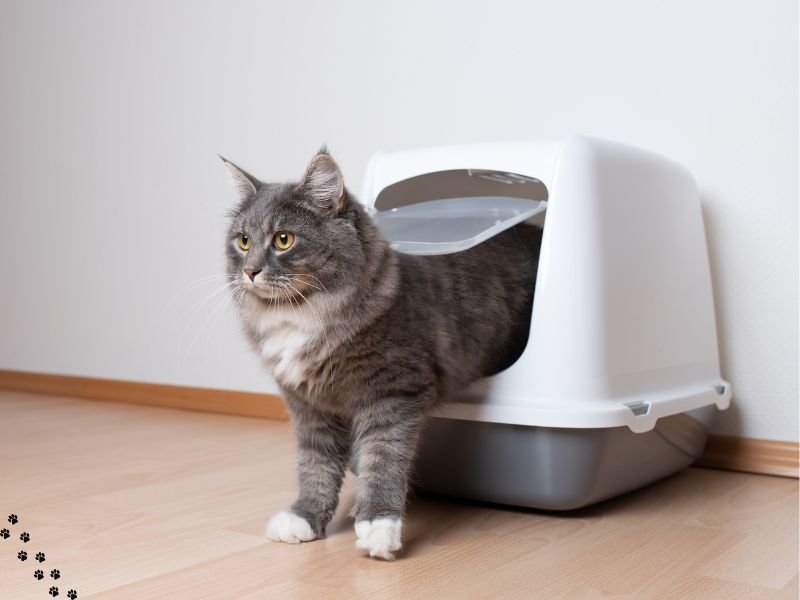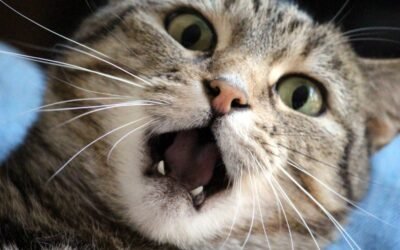Getting straight to the point: indeed, cats can consume smoked salmon, yet it shouldn’t constitute their primary diet.
There’s concern regarding the components found in smoked salmon (significant salt content, potential heavy metals, spices, excess fat) which could potentially damage your feline’s health if provided in substantial amounts.
However, the nutritional advantages could make giving your cat a small portion of this a reasonable idea.
Table of Contents
- Exploring the Safety of Smoked Salmon for Cats
- Understanding the Feline Digestive System: Are Cats Physically Built to Process Smoked Salmon?
- Potential Health Benefits and Risks: Evaluating the Nutritional Value of Smoked Salmon for Cats
- Expert Tips and Considerations for Introducing Smoked Salmon in Your Cat’s Diet
- Signs of Toxicity: Identifying the Dangers of Smoked Salmon in Feline Consumption
- Alternative Treats: Healthy and Safe Options for Treating Your Feline Friend
- FAQs About Can Cats Eat Smoked Salmon
- Conclusion
Exploring the Safety of Smoked Salmon for Cats
Smoked salmon has long been a favorite delicacy among humans, and it’s no wonder that many cat owners are tempted to share this tasty treat with their feline companions.
However, before introducing smoked salmon into your cat’s diet, it’s essential to understand the potential safety concerns and implications it may have on their health.
When considering whether cats can eat smoked salmon, it’s crucial to take into account their unique digestive system.
Unlike humans, cats are obligate carnivores, which means their bodies have evolved to thrive on a diet primarily consisting of animal-based proteins.
While cats can enjoy the occasional fish treat, it’s important to ensure that these treats are safe and nutritionally appropriate for them.
Smoked salmon, although delicious, can pose some risks to cats due to its preparation process.
The smoking process typically involves using salt, sugar, and other seasonings, which can be harmful to felines.
Additionally, smoked salmon is often high in sodium, which can lead to health issues such as dehydration, kidney problems, and even salt poisoning in cats if consumed in large quantities.
Understanding the Feline Digestive System: Are Cats Physically Built to Process Smoked Salmon?
In order to determine whether it is safe for cats to consume smoked salmon, it is important to understand their digestive system and how it functions.
The feline digestive system is suited for processing a diet primarily consisting of animal protein, as they are obligate carnivores.
This means that their bodies are physiologically designed to obtain essential nutrients from meat sources.
Cats have a relatively short digestive tract compared to other animals, which is tailored for efficient processing and absorbing nutrients from their prey.
Their stomachs have highly acidic environments that aid in the breakdown of proteins and kill bacteria.
Additionally, they possess a relatively short small intestine, where the majority of nutrient absorption takes place.
However, when it comes to smoked salmon, there are a few factors to consider. The smoking process involves curing the fish with salt and subjecting it to high temperatures, resulting in changes to its texture, flavor, and nutrient composition.
While cats may be able to digest and benefit from the protein in salmon, the added salt and potential additives used in the smoking process may pose health risks to felines.
Excessive amounts of salt can lead to dehydration and imbalances in electrolytes, which can be detrimental to a cat’s health.
In summary, cats are naturally adept at digesting and deriving nutrients from animal protein sources.
However, the specific concerns surrounding smoked salmon lie in the added salt content and potential additives.
It is essential to carefully evaluate the potential risks before introducing smoked salmon into your cat’s diet.
Consulting with a veterinarian is always recommended to ensure the overall well-being and dietary needs of your feline companion are met.
Potential Health Benefits and Risks: Evaluating the Nutritional Value of Smoked Salmon for Cats
Smoked salmon is a delicious and popular food amongst humans, often enjoyed as a delicacy or in various recipes.
As a cat owner, you might be wondering if it’s safe to share this tasty treat with your feline friend.
This section will explore the potential health benefits and risks associated with feeding smoked salmon to cats, helping you make an informed decision regarding your pet’s diet.
Nutritional Value of Smoked Salmon
Smoked salmon is known for being rich in omega-3 fatty acids, which are essential to a cat’s overall health. These fatty acids play a crucial role in maintaining healthy skin and coat, reducing inflammation, and supporting cognitive function.
Additionally, smoked salmon is packed with protein, contributing to muscle development and tissue repair in cats.
Potential Health Benefits
Feeding small amounts of smoked salmon to your cat can provide them with a nutrient boost.
The omega-3 fatty acids in smoked salmon can support cardiovascular health, promote a shiny coat, and reduce the risk of inflammatory conditions such as arthritis.
As a protein-rich food, smoked salmon can also be beneficial for cats that need extra protein in their diet, such as growing kittens or cats recovering from illness or surgery.
Potential Risks and Considerations
While smoked salmon offers several potential benefits, it’s important to consider the potential risks before introducing it into your cat’s diet.
One significant concern is the high sodium content in smoked salmon, which can be detrimental to a cat’s health.
Cats have a low tolerance for sodium, and excessive consumption of salt can lead to dehydration, electrolyte imbalances, and kidney issues.
Therefore, moderation is key when offering smoked salmon as an occasional treat.
Additionally, the seasoning and curing methods used in the preparation of smoked salmon may include additives like garlic or onion powder, which are toxic to cats.
It’s crucial to ensure that the smoked salmon you provide to your cat is free from any harmful seasonings or additives.
In conclusion, while smoked salmon can offer various nutritional benefits for cats, it should be given in moderation and without any harmful additives.
It’s always best to consult with your veterinarian before introducing any new food into your cat’s diet, especially if your cat has specific health conditions or dietary restrictions.
Expert Tips and Considerations for Introducing Smoked Salmon in Your Cat’s Diet
Incorporating smoked salmon into your cat’s diet can be a tempting option, considering its delectable taste and potential health benefits.
However, it is crucial to tread carefully when introducing this delicacy to your feline friend. Here are a few expert tips and considerations to keep in mind:
Consult Your Veterinarian
Before adding any new food to your cat’s diet, it’s always best to consult with your veterinarian.
They can assess your cat’s specific needs and health conditions to determine if smoked salmon is a suitable addition.
Serving Size and Frequency
Smoked salmon should only be given to cats as an occasional treat and not as a regular meal replacement.
It is essential to monitor the portion sizes as smoked salmon is high in fat content, which can lead to weight gain and digestive issues if consumed excessively.
Proper Preparation
When incorporating smoked salmon into your cat’s diet, it is vital to ensure it is prepared in a cat-friendly manner.
Remove the skin, bones, and any seasoning, as these can pose choking hazards and lead to digestive discomfort.
Sourcing High-Quality Smoked Salmon
Opt for smoked salmon that is free from additives, seasonings, and excessive salt content.
Choose a reputable brand that uses high-quality fish and follows proper smoking techniques to reduce the risk of contamination or exposure to harmful substances.
Monitor for Allergic Reactions
Like any new food, it is crucial to monitor your cat closely for any allergic reactions or digestive issues after introducing smoked salmon.
Common symptoms may include vomiting, diarrhea, or changes in behavior. If any adverse reactions occur, discontinue feeding smoked salmon immediately and consult your veterinarian.
By following these expert tips and considerations, you can make a well-informed decision when introducing smoked salmon into your cat’s diet.
Remember, moderation is key, and it’s crucial to prioritize your cat’s overall health and nutritional needs above their desire for a tasty treat.
Signs of Toxicity: Identifying the Dangers of Smoked Salmon in Feline Consumption
When it comes to feeding your beloved feline friend, it’s essential to be aware of any potential dangers lurking in their diet.
While smoked salmon may seem like a delicious treat for your cat, it’s important to understand the potential risks it poses to their health.
In this section, we will discuss the three signs of toxicity that can occur from consuming smoked salmon and the dangers associated with it.
Gastrointestinal Upset
One of the most common signs of smoked salmon toxicity in cats is gastrointestinal upset. Consuming smoked salmon can result in vomiting, diarrhea, and stomach discomfort.
Cats have delicate digestive systems that may not be able to tolerate the rich and fatty nature of smoked salmon, leading to these unpleasant symptoms.
Salt Intoxication
Another danger to consider when feeding your cat smoked salmon is the high salt content. Cats are not naturally adapted to consuming foods high in salt, and excessive salt intake can lead to salt intoxication.
Symptoms of salt intoxication include increased thirst, excessive urination, dehydration, and in severe cases, seizures or even death.
Smoked salmon often contains a significant amount of added salt during the smoking process, making it potentially harmful to your furry friend.
Mercury Poisoning
Smoked salmon, like other fish, may contain mercury. While small amounts of mercury may not pose an immediate threat, long-term exposure can lead to mercury poisoning.
Cats are more sensitive to mercury than humans, and symptoms of toxicity may include tremors, muscle weakness, loss of coordination, and neurological issues.
It’s crucial to limit your cat’s exposure to fish with potentially high mercury levels, including smoked salmon.
It is important to note that these risks can vary depending on the individual cat, the amount of smoked salmon consumed, and their overall health.
If you suspect your cat has ingested smoked salmon or is exhibiting any signs of toxicity, it is essential to seek veterinary care immediately.
Always consult with your veterinarian before introducing any new food into your cat’s diet and follow their advice to ensure optimal health and well-being.
By being informed about the signs of toxicity associated with smoked salmon, you can make educated decisions about what treats are safe for your feline companion.
Taking precautions and prioritizing your cat’s health will ensure they remain happy and healthy for years to come.
Alternative Treats: Healthy and Safe Options for Treating Your Feline Friend
When it comes to treating our feline companions, it’s important to ensure that the choices we make are not only tasty but also safe and healthy for their well-being.
While smoked salmon may not be the ideal treat for cats due to potential risks, there are plenty of other alternatives that can fulfill their cravings for delicious snacks.
Here are some healthy and safe options to consider:
Cooked Chicken or Turkey
Lean, boneless, and skinless chicken or turkey is an excellent alternative for cats who crave a meaty treat.
These protein-rich options provide essential amino acids that contribute to muscle development, immune support, and overall cat health.
Be sure to remove any seasoning or excess fat before offering it to your feline friend.
Freeze-dried or Dehydrated Meat Treats
These treats are made by removing the moisture from the meat while retaining its nutritional value.
They come in a variety of flavors such as chicken, beef, or fish, and are often packed with protein, vitamins, and minerals.
Make sure to choose brands that contain limited and natural ingredients without any artificial additives.
Kitty Grass or Catnip
Plants such as kitty grass or catnip can be a fun and safe alternative treat for cats. Kitty grass provides essential nutrients while aiding in digestion and reducing hairballs.
On the other hand, catnip is a fragrant herb that many cats find irresistible. It can act as a stimulant, providing mental and physical enrichment for your feline friend.
Small Pieces of Fresh Fruit or Vegetables
Some cats enjoy the taste and texture of certain fruits and vegetables. Small pieces of fruits like watermelon, cantaloupe, or vegetables like cooked carrots or green beans can be given as a treat.
Introduce them gradually and monitor your cat’s response to ensure they are well-tolerated.
Remember, when introducing any new treats into your cat’s diet, it’s crucial to do so in moderation.
Each cat has different dietary requirements, so consult with your veterinarian to ensure the treats you choose are appropriate for your cat’s age, health condition, and overall nutritional needs.
By opting for these alternatives, you can provide your feline friend with a variety of safe and healthy treats that they will enjoy while keeping their well-being as the utmost priority.
FAQs About Can Cats Eat Smoked Salmon
Is it safe for cats to eat smoked salmon?
Smoked salmon is not recommended for cats due to its high salt content and potential exposure to harmful bacteria.
The smoke flavoring and curing process may also contain additives that can be harmful to cats.
Can a small amount of smoked salmon be given to cats?
While a small amount of plain, cooked salmon can be safe for cats as an occasional treat, smoked salmon should be avoided due to the high salt content and potential toxins introduced during the smoking process.
Why is salmon generally good for cats but not smoked salmon?
Salmon is rich in omega-3 fatty acids and can offer several health benefits for cats.
However, smoked salmon undergoes a smoking and curing process that introduces additives, high salt levels, and potential bacteria, making it unsafe for cats.
What are the risks of cats eating smoked salmon?
Eating smoked salmon can cause salt toxicity in cats, which may lead to symptoms like increased thirst, vomiting, diarrhea, excessive urination, and potentially life-threatening conditions.
There is also a risk of exposure to harmful bacteria like Listeria or parasites like Toxoplasma.
Are there alternative sources of salmon for cats?
If you want to incorporate salmon into your cat’s diet, it is safer to provide them with fresh, cooked salmon without any seasonings or additives.
This way, you can ensure your cat enjoys the health benefits of salmon without the potential risks associated with smoked salmon.
Conclusion
Eating smoked salmon is not recommended for cats due to the high salt content, potential exposure to harmful bacteria, and additives introduced during the smoking process.
While plain, cooked salmon can be safe for cats in moderation, it is important to avoid giving them smoked salmon to keep them healthy and free from potential risks.
It is always best to consult with a veterinarian for specific dietary advice for your feline friend.

